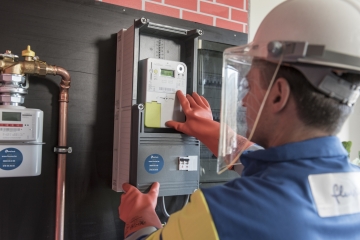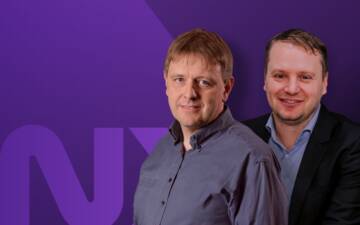Why is the digital meter useful and much needed now?

The ruling by the Constitutional Court, which abolished the reversing counter earlier this year, caused quite a commotion among owners of solar panels. A financial mechanism for this target group suddenly disappeared.
The ruling by the Constitutional Court, which abolished the reversing counter earlier this year, caused quite a commotion among owners of solar panels. A financial mechanism for this target group suddenly disappeared.
Read this article in Dutch.
The ruling by the Constitutional Court, which abolished the reversing counter earlier this year, caused quite a commotion among owners of solar panels. A financial mechanism for this target group suddenly disappeared.
But that has nothing to do with the usefulness and necessity of the digital meter in general, according to just about every Flemish energy expert. Because the new measuring instruments have a lot to offer. What's more: it is this same digital meter that can safely guide us all through the energy transition. And this is not a long-term story - the first concrete applications are already visible today.
To start off on a high note: the digital meter plays a global role in the fight against climate change. An important weapon against this is the energy transition: the global switch from fossil fuels, such as fuel oil or diesel, to renewable energy, such as green electricity. And that is where the digital meter comes in: only with the help of this tool can you monitor your energy consumption and make the switch to other forms of energy as favorable as possible.
The European Commission wants to make Europe the first climate-neutral continent by 2050 by significantly reducing CO2 emissions. To this end, the policymakers are aiming at a much more efficient use of energy and at locally produced renewable energy to gradually replace fossil fuels. As a result, green power is gaining considerable importance as an energy source.
What is so special about the digital meter that it can play such an important role? Compared to its analogue predecessor, the instrument has three new, crucial functions:
- It measures your energy consumption in much more detail, and you can also consult it online
- With its built-in communication technology, it can send and receive data itself, including your meter readings. No more confusion when you move to another house or switch suppliers: we can always find out the correct meter reading.
- You can make your digital meter 'smart' yourself, for example by connecting smart devices to its special ports or using the services of an energy service provider.
The new possibilities offered by digital meters are also the main reason why meter manufacturers worldwide have already switched to digital meters. The old, mechanical meters are hardly ever produced in Flanders.
The digitalisation of energy meters is an unstoppable, international evolution. We must not miss the boat here. Flanders is in the tail of the European pack when it comes to switching to the digital meter. If we do not keep up the pace now, there is a risk that we will lag far behind our neighbouring countries.
Admit it: with the old, mechanical meters, it was extremely difficult to keep track of your consumption. You usually only had to go down to the cellar or garage once a year to do this: during the annual meter reading. And the annual overview that you received afterwards from your energy supplier did not really make you much wiser. Measuring is knowing: the more details you have about your consumption and injection into the energy network, the better the insight.
Only when you have a perfect view of your consumption at all times can you control it and switch on certain appliances at the right time. For example, when you produce green electricity yourself.
Frank Vanbrabant, CEO Fluvius
With a digital meter, you can monitor your electricity and gas consumption almost in real time: every 15 minutes for electricity and every hour for gas. This gives you, as a family or business, a better insight into your energy consumption and injection into the grid. Everyone can consult their energy consumption free of charge on the customer portal https://mijn.fluvius.be (in Dutch). Moreover, you can make your digital meter 'smart' by connecting online apps to it that help you monitor and adjust your consumption. An additional advantage: you no longer need a meter reader.
Do you have solar panels? Then it is best to use the electricity you generate yourself as much as possible. Selling electricity to your energy supplier is also an option. All this is possible with a digital meter. If you want to go even further, you can store your energy surplus in a battery or hot water boiler. In other words: for those who want to be in control of their own energy consumption and production, the digital meter is an indispensable tool.
In the course of 2022, the Flemish energy regulator VREG will introduce a new tariff system for network costs for electricity. From then on, you will no longer pay network costs based on how much you use (in kilowatt hours), but based on how heavily you load the electricity network at the same time (power peaks). The better you spread your consumption, the lower your network costs will be. The digital meter will also play an important role here. Customers without digital meters receive no information about these consumption peaks.
The digital meter also offers many crucial advantages for Fluvius as grid operator. For example, we incur fewer costs due to remote meter readings and less confusion about meter readings, for example when moving to another house or changing suppliers. The digital meter is also a great help in detecting and combating fraud.
But the greatest benefit for all of us lies in avoiding heavy grid investments to enable the energy transition. After all, the switch from fossil fuels to renewable fuels will cause us to use considerably more electricity. Just think of the advance of electric cars. In addition, we are also seeing a sharp increase in the number of wind turbines and solar panels. These will ensure that the Flemish electricity networks will be much more heavily burdened in the near future.
The digital meters provide the necessary data to manage the grids intelligently and to make much more targeted investments. Without digital meters, we would have to make many heavy network investments in extra cables and equipment. We can now avoid these to a large extent: according to our estimates, there will even be 3 billion less by 2050. And of course this is to the advantage of every Fleming: the more efficient the grid management, the smaller the impact on our energy bill.
Conclusion: the digital meter is not only convenient, but also much needed as a tool for conscious energy consumption and numerous future opportunities. And this awareness, in turn, is crucial for the switch to renewable energy: the core of the energy transition. The digital meter can be the key for each of us to contribute to a climate-neutral future.
Latest insights & stories

What does the NIS2 directive mean for your business?
The NIS2 Directive will come into force on October 18, 2024. Companies must take the appropriate measures to ensure their cybersecurity. Valéry Vander Geeten of the CCB and Bart Callens of Proximus NXT set out the preparations you should prioritize.

PROJECT OLIVIA
Every year, the amount of transport over water rises. The same is true for the number of jobs in the maritime sector, in multinationals, local start-ups and within the government. However, it remains a predominantly male sector. We want to change that with Project Olivia, by inspiring women to choose a job on, by or around the water. A goal that we share with many other countries and one which we are eager to cooperate on internationally.

AI will represent 10% of global IT spending by 2028: here's where to invest
As AI accelerates towards becoming 10% of global IT spending by 2028, the challenge lies in choosing the right areas for investment. Explore our insights on how to direct your AI budget towards high-impact, scalable projects that generate measurable business value. Unlock the strategies to turn potential into performance.